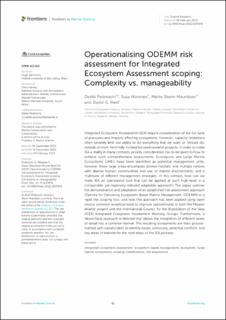| dc.description.abstract | Integrated Ecosystem Assessments (IEA) require consideration of the full suite of pressures and impacts affecting ecosystems. However, capacity limitations often severely limit our ability to do everything that we want or ‘should’ do, outside of short-term fully-funded focused research projects. In order to make IEA a reality in many contexts, priority consideration has to be given to how to achieve such comprehensive assessments. Ecoregions and Large Marine Ecosystems (LMEs) have been identified as potential management units, however these large areas encompass diverse habitats, and multiple nations with diverse human communities and use of marine environments, and a multitude of different management strategies. In this context, how can we make IEA an operational tool that can be applied at such high-level in a comparable, yet regionally-relevant adaptable approach? This paper outlines the demonstration and adaptation of an established risk assessment approach (Options for Delivering Ecosystem-Based Marine Management: ODEMM) to a rapid risk scoping tool, and how this approach has been applied using open source common analytical tools to improve operationality in both the Mission Atlantic project and the International Council for the Exploration of the Seas (ICES) Integrated Ecosystem Assessment Working Groups. Furthermore, a hierarchical approach is detailed that allows the integration of different levels of detail into a common format. The resulting assessments are then ground-truthed with stakeholders to identify issues, omissions, potential conflicts, and key areas of interest for the next steps of the IEA process. | en_US |
